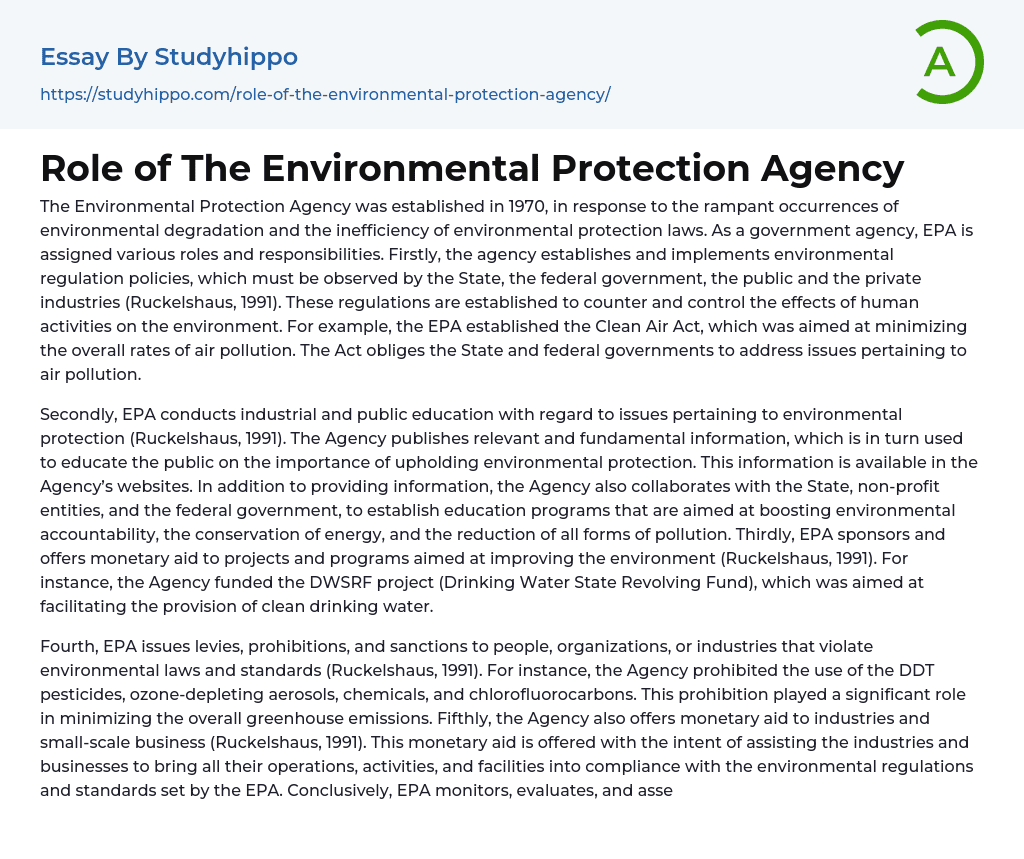The Environmental Protection Agency was established in 1970, in response to the rampant occurrences of environmental degradation and the inefficiency of environmental protection laws. As a government agency, EPA is assigned various roles and responsibilities. Firstly, the agency establishes and implements environmental regulation policies, which must be observed by the State, the federal government, the public and the private industries (Ruckelshaus, 1991). These regulations are established to counter and control the effects of human activities on the environment. For example, the EPA established the Clean Air Act, which was aimed at minimizing the overall rates of air pollution. The Act obliges the State and federal governments to address issues pertaining to air pollution.
Secondly, EPA conducts industrial and public education with regard to issues pertaining to environmental protection (Ruckelshaus, 1991). The Agency publishes relevant and fundamental information, which
...is in turn used to educate the public on the importance of upholding environmental protection. This information is available in the Agency’s websites. In addition to providing information, the Agency also collaborates with the State, non-profit entities, and the federal government, to establish education programs that are aimed at boosting environmental accountability, the conservation of energy, and the reduction of all forms of pollution. Thirdly, EPA sponsors and offers monetary aid to projects and programs aimed at improving the environment (Ruckelshaus, 1991). For instance, the Agency funded the DWSRF project (Drinking Water State Revolving Fund), which was aimed at facilitating the provision of clean drinking water.
Fourth, EPA issues levies, prohibitions, and sanctions to people, organizations, or industries that violate environmental laws and standards (Ruckelshaus, 1991). For instance, the Agency prohibited the use of the DDT pesticides, ozone-depleting aerosols,
chemicals, and chlorofluorocarbons. This prohibition played a significant role in minimizing the overall greenhouse emissions. Fifthly, the Agency also offers monetary aid to industries and small-scale business (Ruckelshaus, 1991). This monetary aid is offered with the intent of assisting the industries and businesses to bring all their operations, activities, and facilities into compliance with the environmental regulations and standards set by the EPA. Conclusively, EPA monitors, evaluates, and assesses the environment (Ruckelshaus, 1991). In this case, the agency studies the environment, to establish whether it is depleted or not. Additionally, it also studies the environment, to determine whether, people, organizations, industries, and other entities are observing the environmental standards and regulations.
Arguments for and Against EPA’s Role in the Regulation of Business
The role of EPA in the regulation of businesses has raised diverse contentions. On one hand, parties that argue for EPA’s role in the regulation of business, claim that the agency plays a fundamental role in regulating businesses. In this regard, the agency regulates business operations, tools, and practices to ensure that they comply with the environmental standards. For example, EPA regulates the amount of pollutants through the TRI (The Toxic Release Inventory) program. Additionally, EPA also regulates energy and water usage by businesses (Lesser, 2015). On the other hand, parties, which argue against EPA’s role in the regulation of business, claim that the agency does not play a predominant role in regulating business operations and activities. They claim that EPA is only charged with the role of addressing issues pertaining to the environment. In this regard, parties that argue against the agency’s role in business regulation, fail to acknowledge the fact that businesses also
affect the environment through issues such as pollution, energy usage, and water usage.
References
- Lesser, W. (2015). American Business Regulation: Understand, Survive and Thrive. Routledge.
- Ruckelshaus, W. D. (1991). Role of the Environmental Protection Agency, The. BC Envtl. Aff. L. Rev., 19, 725.
- Environmental Disaster essays
- Sustainable Development essays
- Animal Welfare essays
- Zoo essays
- Plastic essays
- Waste Management essays
- Climate Change essays
- Global Warming essays
- Conservation essays
- Recycling essays
- Air Pollution essays
- Carbon Dioxide essays
- Climate essays
- Deforestation essays
- Ecology essays
- Endangered Species essays
- Environmental Issues essays
- Environmental Protection essays
- flood essays
- Greenhouse Gas essays
- Hurricane essays
- Nature essays
- Pollution essays
- Renewable Energy essays
- Sustainability essays
- Tornado essays
- Traffic essays
- Tsunami essays
- Water Pollution essays




